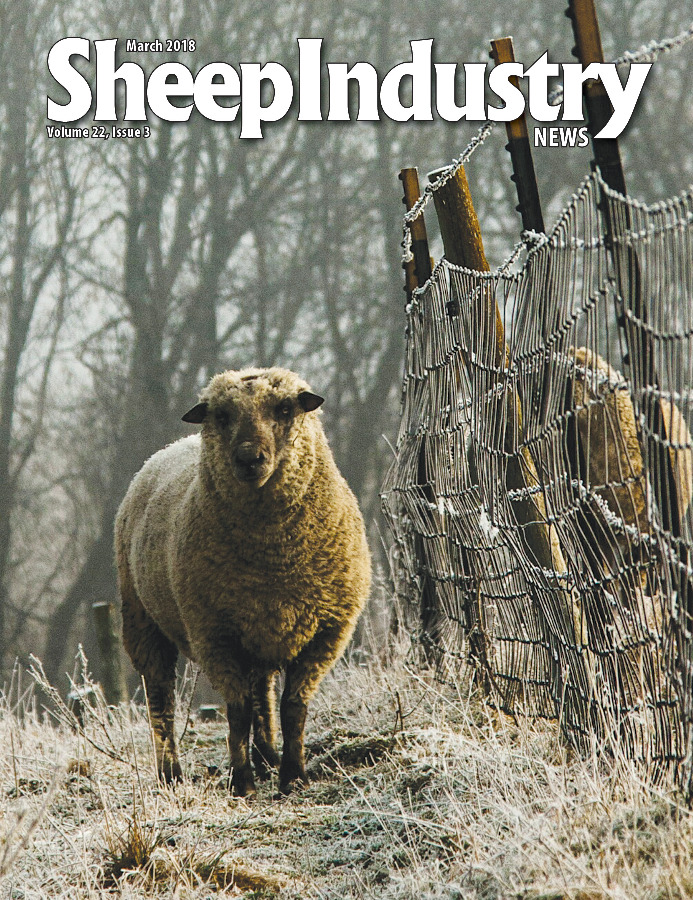
- March 2018
- President’s Notes
- Jerry King Cartoon
- Convention: Sheep Producers Share Concerns with USDA
- Convention: Industry Leaders Recognized
- Convention: MIWW Celebrates 70 Years
- Convention: American Wool Uses Technology
- Convention: Nourish With Lamb Spreads Message
- Convention: PERC Discusses Possible FMD Outbreak
- Convention: Kangols Top Guard Dog Breed
- Convention: Genetic Stakeholders Understand Value of Data
- Convention: Sheep Disease Updates
- Convention: Resource Management Eyes Progress
- Convention: Young Entrepreneurs
- Electronic Grading Approved at Superior Farms
- ALB Picks Denver as Next Target Market
- Wool is Popular at Outdoor Show
- Sheep Inventory Flat in 2017
- Feedlot Report Available
- Young Entrepreneur: Jake Kerr
- Sec. Perdue Names ALB Appointees
- Three Appointed to Sheep Center
- Around the States
- Market Report
- The Last Word
Electronic Grading Approved at Superior Farms’ Dixon Plant
Superior Farms, North America’s largest lamb processor, announced that it has received approval from the U.S. Department of Agriculture to begin grading carcasses with the VSS2000 System camera (electronic grading) – the first digital camera to be approved for use in the American lamb industry.
The new digital camera was installed in October 2015, and Superior Farms has worked hand-in-hand with USDA to secure approval since that time.
“Our team worked closely with the USDA for two years validating the camera’s algorithms to assure accurate full carcass measurements of both yield and quality grades,” said Superior Farms President and CEO Rick Stott. “Combining electronic grading with our producer portal will allow unprecedented access to carcass information by our producer partners that will allow every segment of our industry to continue to produce a better product.”
This electronic grading system will provide Superior Farms’ producers detailed meat information about their lambs.
“We will now be able to share this detailed information with our producer partners through our producer portal,” said Superior Farms Director of Producer Resources and Sustainability Lesa Eidman. “This information includes the USDA yield grade and quality grade, as well as the ovine cutability calculation, the primal weights (leg, loin, shoulder, rack, breast, trotters and neck) and two digital images of each lamb carcass processed.
“This technology will provide our producers an unprecedented amount of information about the meat and carcass characteristics of their lambs. Ultimately, producers will be able to make genetic and production changes to provide U.S. lamb customers with the highest quality, most consistent product we can deliver.”
The next steps are to: First, pair this information with the electronic identification tags so that producers can see the data on an individual lamb basis. Second, is to implement the technology in Superior Farms’ Denver facility.
“Now that we have received approval from USDA for the camera grading, we can begin implementing the technology in our Denver facility,” Stott noted. “We look forward to working with the USDA to expedite the approval process so that both of our facilities have this state of the art technology.”
The USDA grader will remain onsite to verify that the technology remains accurate and in-line with USDA grading standards.
The American Lamb Board has been a vital participant in bringing this development to fruition. Most importantly, the board funded electronic grading research conducted by the Center for Meat Safety and Quality in the Department of Animal Sciences at Colorado State University.
In their study titled Industry Implications and Economics of Implementation of Lamb Instrument Grading, the university found overwhelming evidence of the value of the camera technology and concluded, “unprecedented information about lamb carcass composition and value will be collected and available. True production management decisions can be made by U.S. sheep producers with conveyance of product attributes of harvested lambs.”
Electronic instrument grading has been on the lamb processing radar for nearly a decade. ASI’s Lamb Council and USDA’s Agricultural Marketing Service lined up and began testing the very first machines in an effort to automate the lamb carcass grading process. The American Lamb Board then took the lead in assisting Superior Farms with adding electronic grading to its newest plant in Dixon, which opened in 2016.
“ASI has long seen the value in adding electronic grading capability to the carcass process,” said ASI President Mike Corn of New Mexico. “We’re excited to see that the technology is in use.”

